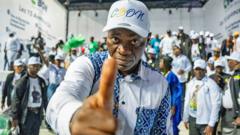As Gabon prepares for presidential elections, former coup leader Oligui Nguema showcases a commitment to democratic governance, incorporating broader political voices into his regime and fostering international ties.
**Gabon Moves Towards Democratic Elections as Coup Leader Embraces Change**

**Gabon Moves Towards Democratic Elections as Coup Leader Embraces Change**
In a surprising shift for military leaders, Gabon's Brice Oligui Nguema promotes democracy after a peaceful coup.
Little over 19 months since Brice Clotaire Oligui Nguema led a bloodless coup to displace the Bongo family's decades-long rule, the nation of Gabon is gearing up for presidential elections, defying the trend observed in several African nations where military leaders typically consolidate power. Oligui Nguema, now pivoting from military attire to a tailored suit, has emerged as the clear frontrunner among eight candidates. His platform is reminiscent of the nation's collective desire for responsive governance, utilizing the catchphrase "C'BON"—a clever nod to the French phrase "c'est bon," or "it's good."
With significant backing from a populace eager to move beyond the Bongo era and benefitting from electoral rules that barred key competitors, the 50-year-old is poised for a decisive victory in the upcoming polls. Alain-Claude Bilie-By-Nze, the last prime minister under the ousted Ali Bongo, stands as his principal challenger. However, Oligui Nguema's chances of winning outright appear promising, as he dismisses a second-round runoff.
Successful leadership will provide U.N. with a mandate for a seven-year term, offering resources to implement development and modernization initiatives previously unattainable by leaders amid crises—it remains to be seen, however, whether he can meet the expectations of a population impacted by poverty in an oil-rich nation.
While turmoil often defines military takeovers in the region, Gabon's transition saw few complications; there was little resistance when the military intervened post-election last August, as it was widely perceived that Ali Bongo's purported victory in the polls was fraudulent. Public sentiment favored change, especially as dissent against dynastic politics grew amid suspicions surrounding Bongo’s health and his family's ambitious influence.
The coup's aftermath saw widespread relief, even among previous political elites, as Oligui Nguema engaged a broad political coalition comprising former rivals and notable civil society figures, facilitating a new governance structure. Moreover, unlike his counterparts in West Africa, Oligui Nguema has fostered cordial relations with France, assuring traditional partners of his commitment to restoring a constitutional government within a short temporary frame.
On the domestic front, he has undertaken to revitalize public infrastructure, maintain essential projects, and reclaim Gabonese control of foreign assets in the oil sector, positioning himself as a responsive leader addressing public dissatisfaction. However, the upcoming transition may threaten to overburden Oligui Nguema with expectations, as he consolidates all executive powers—a move that raises questions about accountability in a democratic framework.
While he enjoys popular support, challenges remain. Civil society leaders, previously excluded from decision-making, may now rise to influence the next administration. Gabon's opposition remains fragmented and awaits Oligui Nguema's governance, as citizens yearn for job creation, improved public services, and environmental sustainability amid pressures from resource utilization.
Despite initial successes, Oligui Nguema will have to navigate political expectations and the societal demands of a diverse nation as he embarks on his new role, quickly proving that the real governance begins with the upcoming election results.




















